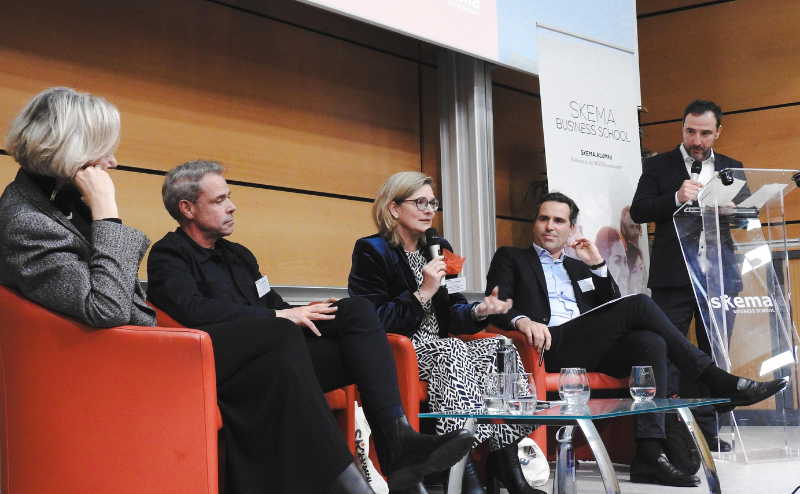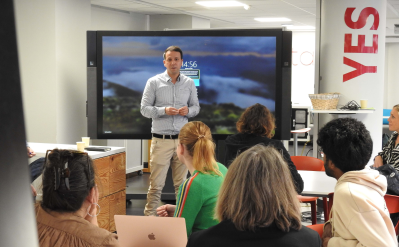News

How has management now become a "major art form"?
Over 70 alumni and corporate partners attended the "Managing in the 21st Century: A Major Art Form" round-table held at SKEMA Lille on 14 November! This event, organised jointly with the Corporate Department, focused on the theme of SKEMA Business Hub's "Regards croisés" report analysing the challenges of management in a world in transition(s).
After a keynote by Fabien Seraidarian,
Vice-Dean of Research and Director of SKEMA Business School’s Global Executive MBA programmes, our four guest speakers — Kate Chemière (SKEMA 1991), Head of Executive HR Projects at Groupe Crédit Agricole; Sylvie Fouillouse de Paris (SKEMA 1988),
former head of HR at GL Events and now in the process of setting up her own company; Joannes Soënen (SKEMA 1992), CEO of Jules; and Julien Barrois, Managing Director Michael Page Lille
— were able to share their respective backgrounds and experience on this subject.
For those of you who were unable to attend, we present the highlights of the event below, along with some of the insights offered by our experts.
Managing in a chaotic context
Fabien Seraidarian began by presenting management as a major art form in this "chaotic" context. There were three key parts to his presentation:
-
The manager and the challenge of
transformation - The emergence of new managerial figures
- Towards the advent of the managerial function
According to Fabien, managers are undeniably faced with what he calls the "Red Queen effect" or, in other words, the idea of constantly having to do more to remain competitive. Added to this is the notion of a world defined by expert analysts as "VUCA": volatile, uncertain, complex, ambiguous. It is difficult for managers to evolve, lead and make decisions in such an environment. Finally, Fabien spoke of the powerful notion of acceleration, a marker of our late modernity, referring to the author Hartmut Rosa’s book, Resonance, A Sociology of Our Relationship to the World.
This raises some obvious questions: How do we manage in such an environment? In a context of frequent reorganisation? How do you "build a career" in a context where skills are becoming increasingly specialised?
When managers also become leaders, they must manage the factors of change and complexity mentioned above, all with the aim of motivating employees.
To illustrate this point, Fabien quoted Arnaud Quintin, VP, Head of Organisation at Groupe Renault, who very aptly said: “Management has never been as important as it is today. When you're in a complicated, tense, crisis situation, and your teams don't necessarily have the resources to fight, if management collapses, everyone collapses. To have no management is madness."
In addition to this, there is the very modern issue of employee mental health. Fabien went on to ask: How do you become a meta manager? How do you formalise the managerial function? An answer is of the utmost importance: managing is not just a question of aptitude; it requires knowledge and know-how.
He concluded his presentation by outlining the contours of the managerial function, which he narrows down to two objectives: moving from dream to reality, and moving from desire to possible. Here, we detect the idea of direction and action and understand that this many-hatted role requires the ability to give direction, take charge, adjust and arbitrate.
New forms of management
This presentation gave our guest speakers some food for thought and fuelled a fascinating debate.
Different points of view intersected:
Sylvie Fouillouse de Paris pointed out that there is a prerequisite for management; that for everything to work, there needs to be a clear company vision and the company’s speed must be adapted to employees.
Julien Barrois questioned the notion of Art. In his view, managers have been training themselves by mimicry for decades, and this no longer fits with today's evolving expectations. A new mindset has taken hold in business and society.
Joannes Soënen noted that in the textile retail sector, to draw a parallel with his own industry, this contradiction between the urgency of day-to-day business pressures and preparation for the future is perfectly apparent. He explained that there are different contexts, different audiences, so there is no single managerial incarnation. He added: “You can't constantly chase after transformation; you have to embrace the pauses to gain new impetus.”
Kate Chemière, spoke about the role of the manager, who must be inspired and inspiring, know the purpose of their mission and energise their staff, while offering both flexibility and rituals for greater stability.
It seems clear, then, that new forms of management are developing and are expected in companies. Other questions arose from this debate and were put to our guest speakers:
-
Have you detected this "art of managing" in the workplace?
- How can we help managers in these changing contexts?
- Can we still talk about impact and performance in the manager's role?
A Q&A session followed, and Fabien Seraidarian made some closing remarks, quoting the writer Hartmut Rosa once again. He asked us "what kind of relationship to the world we wish to build", from both a personal and a professional point of view, and told us about this "resonance relationship", in other words, how to build our relationship to the world so as to no longer feel enslaved to pressure and rather to welcome all new situations with interest.
Find out more about the presentation and the debate by watching the replay of the conference:
If you'd like to learn more on the subject, we invite you to read the analysis entitled "Manager au XXIème siècle : un art majeur, Comment diriger dans un monde en transition(s)” (in French), produced in partnership with Sopra Steria Next.
Don't miss our upcoming events that could boost your career and enable you to meet passionate and fascinating experts!
And to relive the conference through pictures, take a look at the photo gallery.




